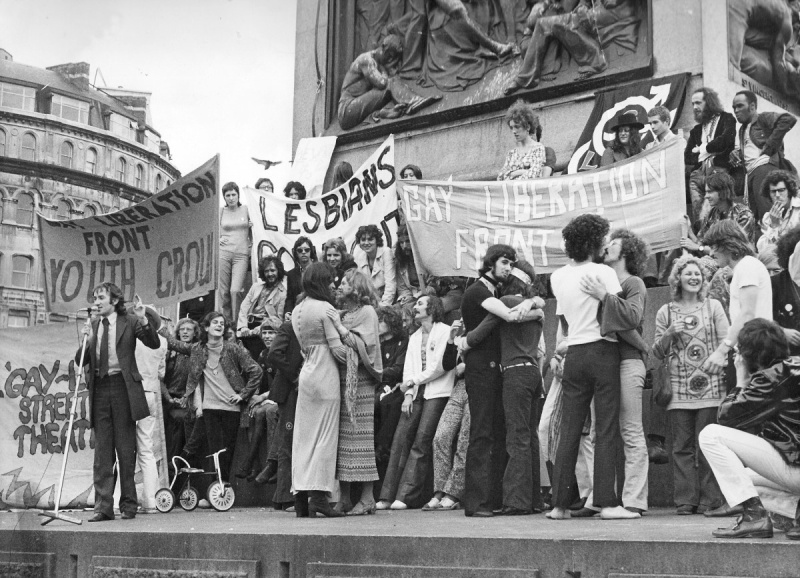It's Pride Month!
And we’re celebrating a little differently this year
Jun 03, 2021

By Celia Shea, Communications
June is normally the month of parades. Film festivals, drag shows, live music, parties – this is what makes Pride, well, Pride...right?
Parades, rainbows and confetti are fun ways to celebrate love in June. But since big business and politicians tried to re-package Pride in their own image by stripping the movement of its revolutionary roots and reducing it to these trimmings, we think working people can find even better ways to celebrate.
So, while AUPE’s Human Rights Committee is lamenting the pause on events that would typically kick off Pride month in Alberta due to COVID-19, we’re also using this interruption to refocus.
This might not be the year of Pride parties, but it is the year we can make Pride a people’s movement again. And we can start by listening to the LGBTQia2s+ voices that corporate-sponsored Pride stifles: Transgender people, people of color, working people, two-spirit Indigenous people, and women, to name a few.
These folks continue to be some of the most important trailblazers for queer liberation movements, and this Pride month, we want to amplify their stories. Here are some ways you can actually honor the LGBTQia2s+ community in all its diversity, vibrancy and resilience this year.
1. Learn the names of history’s heroes
Like most liberation movements, it was the most underserved activists who drove the gay rights movement forward. But you wouldn’t know it from the Whitewashed accounts of history that exclusively spotlight white, middle-class, CIS male heroes of the gay liberation movement.
In reality, Pride has strong working-class roots, and you’ll know from being in a big union that this means it was a collective effort spearheaded by a diverse crowd. Here are some of the lesser-known heroes you might not know about:
Marsha P. Johnson
We can’t talk about Pride without talking about Marsha P. Johnson, the warm and generous trans sex-worker who played a critical role in the 1969 Stonewall Riots and contributed to several grassroots alliances with working-class LGBTQia2s+ in New York. These included the Gay Liberation Front and AIDS Coalition to Unleash Power, among others.
Performance artist Agosto Machado, who knew Johnson as early as the mid 60s, once said in an interview, “Marsha always gave this blessed presence and encouragement to be who you wanted to be. Those who were a little too feminine were frowned upon, but Marsha and a few others would stand ram-rod straight, shoulders back, head high and present themselves and that…gave happiness to people.” Another friend said, “She had this kind of glow about her…. Her spirit shone through her.”
Known for her eccentric attire and bright personality, Johnson was dedicated to direct action and achieving political equity for all members of the LGBTQia2s+ community. Learn more about her in the Netflix documentary The Death and Life of Marsha P. Johnson.
Sylvia Rivera
Best known for co-founding Street Transvestite Action Revolutionaries (STAR) with Johnson in 1970, Rivera, a long-time Hispanic and trans rights activist, was another powerhouse in the New York gay liberation scene.
Her STAR project, which started as a temporary trailer park shelter for transgender and underserved youth, became the first permanent LGBTQ shelter in the country, when she and Johnson found a fixed address in a building.
Known for her fiery speeches and inspiring passion, Rivera was a true revolutionary and outspoken opponent of for-profit Pride festivals. She participated in what’s been dubbed the first Pride and “found it offensive that, in the beginning, after four years of this revolution of ours, that we allowed straight vendors into our streets, into our mecca, for them to take our almighty dollar when they didn’t even respect us. Now what kind of logic is that?”
Edie Windsor & Thea Spyer
Have you heard of these two? They were the lesbians who helped establish the legal precedent for same-sex marriage in 2013 when Windsor sued the United States government. She filed the lawsuit after she was unfairly taxed $300,000 on the estate of her partner, Thea Spyer, who had passed away from multiple sclerosis. Having met in the early 60s, they were partners for decades, and in their later years, Windsor was Spyer’s main caregiver, helping her navigate the world with her MS-related disabilities.
Windsor, a long-time activist, stayed vocal about gay right up until her death, and was an active member of the Services & Advocacy for LGBT Elders. Learn more about her and Spyer in the documentary Edie & Thea: A very Long Engagement.
2. Read, Watch and Listen
Podcasts, articles and films about the intersection between LGBTQia2s+ rights and workers’ rights abound. Here’s a few titles to add to your list of must watch/reads/listens:
Vriend v Alberta
Read about the man behind the case that would make it illegal for organizations to fire people in Alberta for being gay:
https://scc-csc.lexum.com/scc-csc/scc-csc/en/item/1607/index.do
Watch Pride
This feature length film is all about the time Gay Activists united with Coal Miners in South Wales in the 1980s. Read more about it, here.
Read an Interview with Murray Billett
Past UNA Educator and prominent expert in Edmonton's LGBT movement through the 1980s and 1990s speaks: http://albertalabourhistory.org/wp-content/uploads/2018/05/2013091001-02-Billett-Murray-corJK-with-Billett.pdf
Read "Labour Pride: What Our Unions Have Done for Us"
https://sefpo.org/wp-content/uploads/2014/09/labour_pride_2014.pdf
3. Stay tuned to AUPE's Facebook
Over the next month, we’ll be posting more articles, movies, and resources related to LGBTQia2s+ justice. Like the AUPE Facebook page to access these awesome resources!